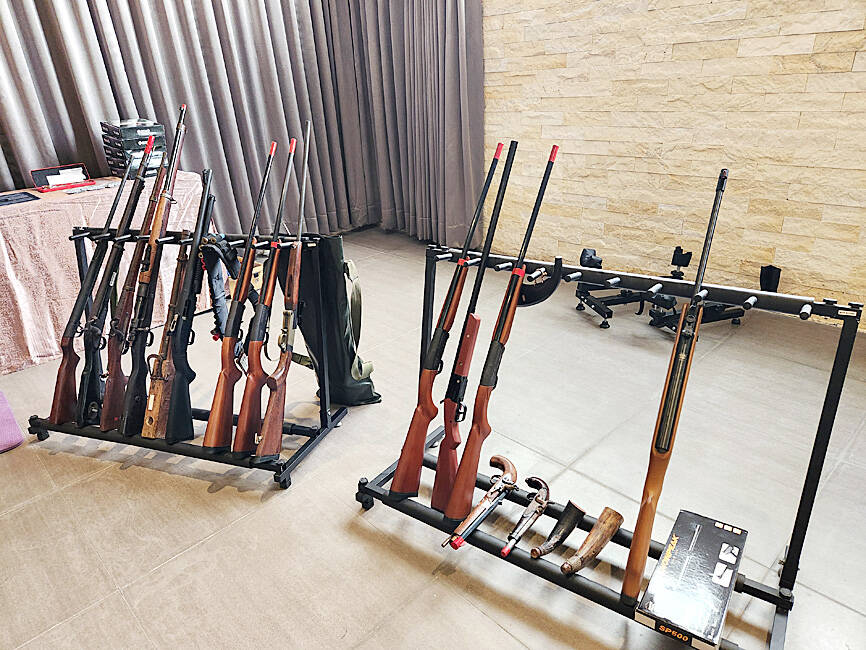Indigenous people who plan to import homemade guns for hunting purposes would be required to pass a training course administered by the Council of Indigenous Peoples on safe use of hunting guns, the council said yesterday.
The council yesterday launched its first safe-use training session for homemade guns in Taoyuan in accordance with ruling No. 803 issued by the Constitutional Court on May 7, 2021.
The ruling requires the Ministry of the Interior to include in the Regulations Governing Permission and Management of Guns, Ammunition, Knives and Weapons (槍砲彈藥刀械許可及管理辦法) a clear definition that protects the constitutional right of indigenous people to engage in legal hunting activities through the safe use of “self-made” hunting guns.

Photo: Chou Min-hung, Taipei Times
An amendment to regulations must be proposed within two years following the issuance of the ruling, the court said
The ruling recognizes indigenous hunting cultures and ecosystem protection as important values protected by the Constitution, Council of Indigenous Peoples Minister Tseng Chih-yung (曾智勇) said at the opening ceremony of the course.
“The first training course is to serve as a trial, and it would help modify training for indigenous hunters’ needs,” Tseng said. “In the future, indigenous people would be required to pass a training course for the safe use of hunting guns before they can apply to have them imported to Taiwan, according to the amendment to the regulations proposed by the National Police Agency last year.”
The training would ensure the safety of indigenous hunters and sustainable conservation of indigenous hunting cultures, he said.
The course includes 10 hours of gun use, three hours of training on basic knowledge of hunting and 11 hours in the field, the council said, adding that it would include the importance of wildlife protection in indigenous cultures and regulations.
The council added that it is considering allowing indigenous people and hunters’ associations to facilitate an 11-hour hunting practice section.

A preclearance service to facilitate entry for people traveling to select airports in Japan would be available from Thursday next week to Feb. 25 at Taiwan Taoyuan International Airport, Taoyuan International Airport Corp (TIAC) said on Tuesday. The service was first made available to Taiwanese travelers throughout the winter vacation of 2024 and during the Lunar New Year holiday. In addition to flights to the Japanese cities of Hakodate, Asahikawa, Akita, Sendai, Niigata, Okayama, Takamatsu, Kumamoto and Kagoshima, the service would be available to travelers to Kobe and Oita. The service can be accessed by passengers of 15 flight routes operated by

GIVE AND TAKE: Blood demand continues to rise each year, while fewer young donors are available due to the nation’s falling birthrate, a doctor said Blood donors can redeem points earned from donations to obtain limited edition Formosan black bear travel mugs, the Kaohsiung Blood Center said yesterday, as it announced a goal of stocking 20,000 units of blood prior to the Lunar New Year. The last month of the lunar year is National Blood Donation Month, when local centers seek to stockpile blood for use during the Lunar New Year holiday. The blood demand in southern Taiwan — including Tainan and Kaohsiung, as well as Chiayi, Pingtung, Penghu and Taitung counties — is about 2,000 units per day, the center said. The donation campaign aims to boost

ENHANCING EFFICIENCY: The apron can accommodate 16 airplanes overnight at Taoyuan airport while work on the third runway continues, the transport minister said A new temporary overnight parking apron at Taiwan Taoyuan International Airport is to start operating on Friday next week to boost operational efficiency while the third runway is being constructed, the Ministry of Transportation and Communications said yesterday. The apron — one of the crucial projects in the construction of the third runway — can accommodate 16 aircraft overnight at the nation’s largest international airport, Minister of Transportation and Communications Chen Shih-kai (陳世凱) told reporters while inspecting the new facility yesterday morning. Aside from providing the airport operator with greater flexibility in aircraft parking during the third runway construction,

American climber Alex Honnold is to attempt a free climb of Taipei 101 today at 9am, with traffic closures around the skyscraper. To accommodate the climb attempt and filming, the Taipei Department of Transportation said traffic controls would be enforced around the Taipei 101 area. If weather conditions delay the climb, the restrictions would be pushed back to tomorrow. Traffic controls would be in place today from 7am to 11am around the Taipei 101 area, the department said. Songzhi Road would be fully closed in both directions between Songlian Road and Xinyi Road Sec 5, it said, adding that bidirectional traffic controls would